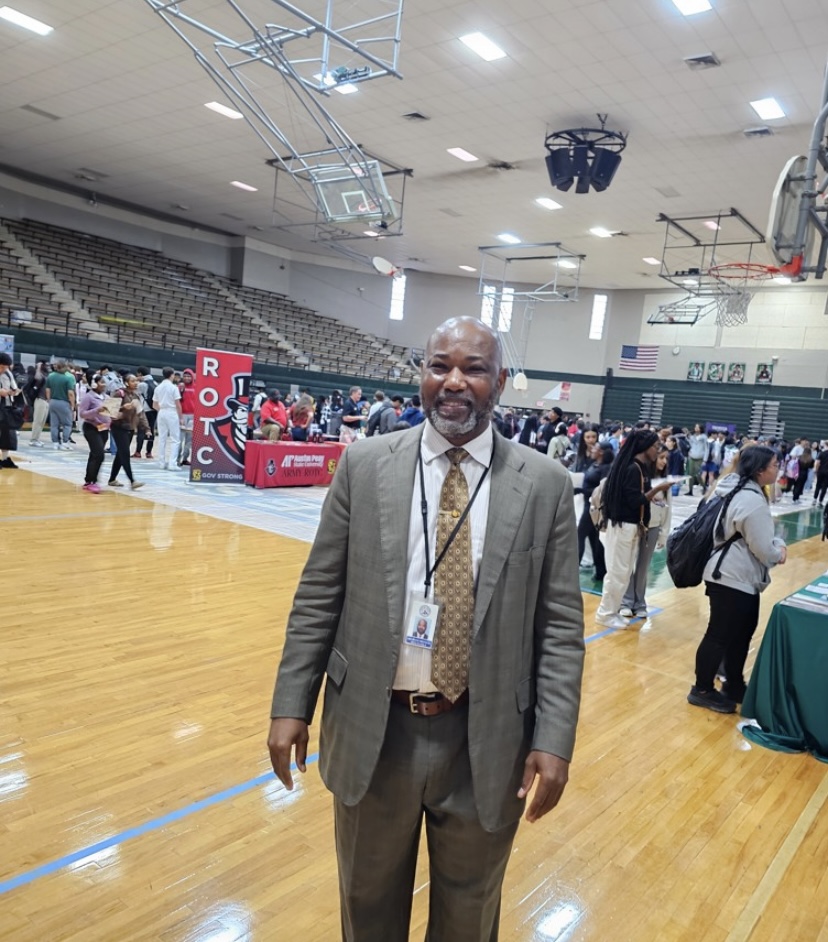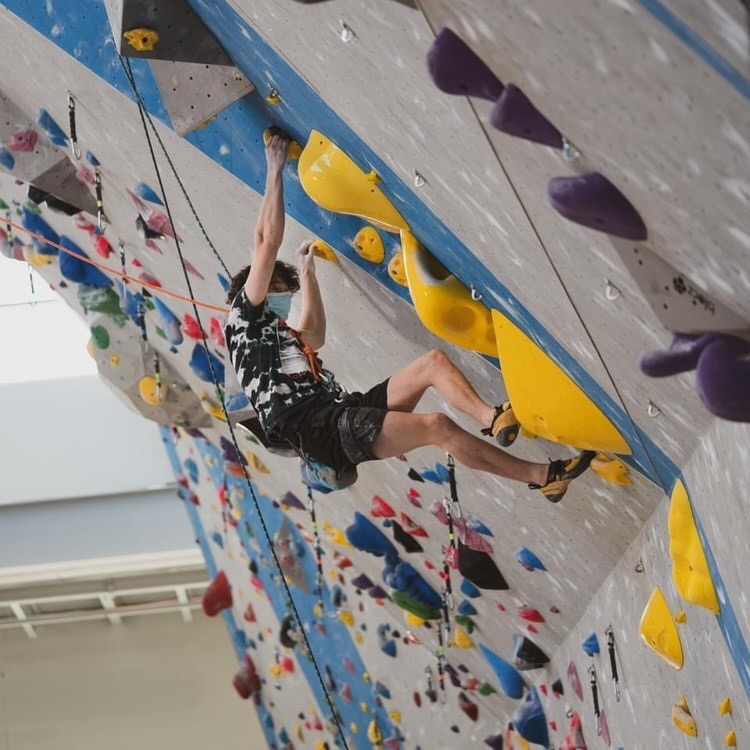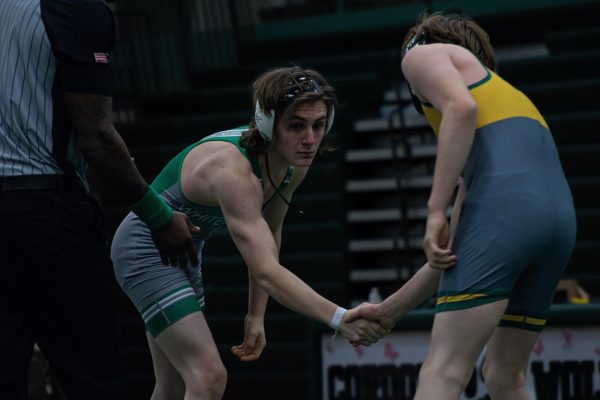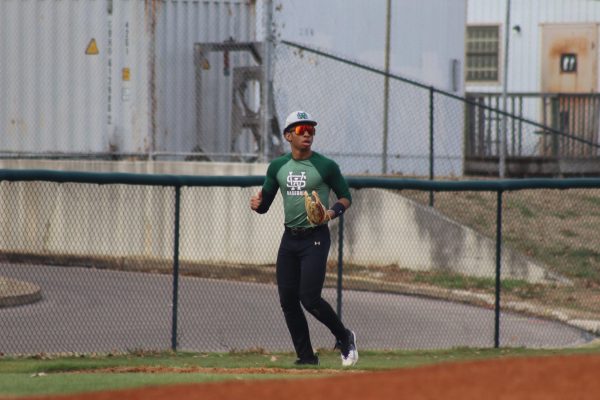Winkle defies gravity and childhood cancer
Micah Winkle (10) climbs at the U.S. paraclimbing national championship qualifiers in Salt Lake City, Utah during June 2021. Winkle placed first in qualifiers and proceeded to the finals, where he also placed first, earning him a spot on the 2021 U.S. paraclimbing team and enabling him to compete at the world championships in Moscow, Russia, a few months later.
After being diagnosed with Ewing sarcoma in the left femur at the age of nine and conquering major surgery at age 10, Micah Winkle (10) has already thwarted various odds. To add to an already remarkable childhood, Winkle has become a national US paraclimbing champion — and has placed in international world championships while representing the US paraclimbing team.
Due to the effects of cancer and surgery, Winkle has not been able to play any contact sports since the age of 10. Despite climbing being a safe option for Winkle, he did not originally seek out the sport.
“I was at an event in California for the hospital I went to for my cancer — it was to raise money for St. Jude, which is where I went,” Winkle said. “We met the owner of the climbing gym [I go to now], and he said, ‘I’m opening a gym in a month or so in Memphis,’ and we said, ‘Oh that sounds great, we’ll check it out.’ We went the very first day it opened, and ever since then, I just kept on going back.”
Similar to his start in climbing, Winkle did not seek out competitive climbing until some friends began to nudge him into joining the climbing team at Memphis Rox, the climbing gym where Winkle started climbing and still frequents today. After about a year of climbing as a hobby, Winkle joined the Memphis Rox climbing team and noticed major growth in his abilities.
“The first year was me just having fun with it, and then some of my friends joined the team [at Memphis Rox], and they started getting really good, and they were like, ‘You should join,’” Winkle said. “So I ended up joining, and I got really good pretty quickly and started competing and had fun competing, so I kept on doing it.”
Although Winkle trains at Memphis Rox with a fully able-bodied team, lasting effects from his surgery qualify him as a paraclimber while competing. Competitions for paraclimbers are almost identical to able-bodied competitions, with rules and scoring being the same.
“When I had cancer, they replaced 90% of my [left] femur with a titanium prosthesis, and they took out 50% of the muscle, and I also had a lot of nerve damage with it,” Winkle said. “I can’t move my left foot as well, and my left leg is significantly weaker. I have range of motion problems, so I can’t bend it to certain points, and that is why I compete in paraclimbing.”
Paraclimbing competitions uniquely include divisions that are determined by the extent of physical restrictions a climber has. Since Winkle only experiences range and strength loss, he is in the least extreme category of physical restrictions.
“I am in the RP3 category, which is range and power three, [and the way it works] is you basically have a range of motion, a range of power or a range of strength, and it determines your category,” Winkle said.
Despite success in competitive climbing, challenges always arise for athletes when performing a sport with physical restrictions. For Winkle, these challenges stem from the gap in physical abilities between his teammates and himself.
“I’m on a team with all able-bodied climbers, so they all have different sequences than me because they can use their left leg, and that’s been the main challenge, but I mostly can get through it,” Winkle said.
However, these challenges have done little to hold Winkle back from competing. Amongst the different types of competitive climbing, he specializes in sport climbing, which focuses on accuracy and endurance.
“I compete in sport climbing, which is on ropes, so top rope or lead, which is scored by the amount of holds you get, and each hold gets a point,” Winkle said. “So it’s based on how high you get, and then if it comes down to a tie, it goes back to qualifications like who scored higher in qualifiers, and if you tied in qualifiers, then it would come down to speed.”
Through his skill in sport climbing, Winkle has been able to advance through many levels of competitive climbing. So far, his biggest accomplishment has been placing in the 2021 World Championships, which were held in Moscow, Russia. Because world championships only occur every two years, the championships are massive and present an important opportunity.
“I won nationals here; I placed first, and the top three in each category qualified for world championships and world cups,” Winkle said. “So I qualified, and I ended up seventh in the 2021 World Championships, which is pretty good for my first time.”
While championships can be physically taxing, Winkle consistently looks forward to competitive opportunities because of the creativity each climber can display while on a new route. The challenge of something new is what exhilarates Winkle rather than frightens him.
“[It is always] super fun because each route is different; you’ll never climb the same route or compete on the same route,” Winkle said. “So it’s always a challenge of learning a different movement, a different skill [and] being able to put the route together in that minute.”
Luckily for Winkle, he gets to experience this exhilaration almost weekly due to the number of competitions he attends. Only about a month after the 2021 World Cup in Moscow, he is already preparing to travel to Los Angeles, Calif., for a world cup alongside the 2021 US paraclimbing team.
“I have a world cup in LA in two or three days; I leave after school [Oct. 7], and it’s the same idea as Moscow but just slightly less major, because world cups happen a few times every year, and world championships are once every two years,” Winkle said.
Amongst his accomplishments and busy schedule, it is easy to forget that Winkle is still a high school student with a workload and responsibilities. Because of his almost daily practice schedule, finding time to balance school, social activities and climbing can be extremely tedious.
“There’s definitely a lot of times where I have to stay up crazy late to do homework because I practice every day for like hours upon hours,” Winkle said. “Every weekend for the past two months now, I’ve either had a climbing trip or a competition or extra practice, so I can’t get homework done over the weekend. So it’s really hard to balance life and climbing.”
Nonetheless, climbing has become a vital part of Winkle’s life, and he considers it to be a space where he can exhale and empty busy thoughts from his mind. As one can imagine, a safe space like this is irreplaceable to someone who has overcome many challenges to excel in a sport he loves.
“It lets me clear out my mind from everything else,” Winkle said. “Whenever I climb, I don’t think of anything else other than climbing. Like there’s been times where I’ve been climbing in competitions, and there’s a giant crowd yelling, and I don’t hear a single thing.”
Your donation will support the student journalists of White Station High School. Your contribution will allow us to purchase equipment and cover our annual website hosting costs.





































